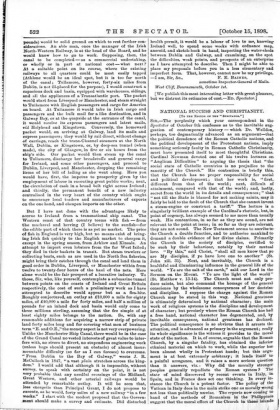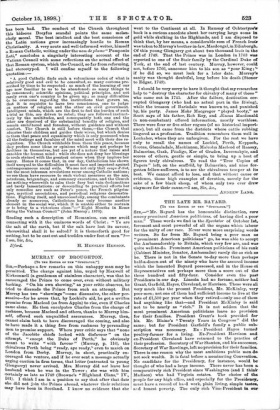NATIONAL SUCCESS AND CHRISTIANITY.
[To THE EDIT011 OE THE " SPECTATOB."] STE,—The perplexity which your correspondent in the Spectator of October 8th confesses as to the inevitable sug- gestion of contemporary history — which Dr. Welldon,, perhaps, too dogmatically advanced as an argument—that the political decadence of the Roman Catholic nations, and the political development of the Protestant nations, imply something seriously faulty in Roman Catholic Christianity,. must have presented itself to most thoughtful Christians. Cardinal Newman devoted one of his twelve lectures on "Anglican Difficulties" to arguing the thesis that "the social state of Catholic countries is no prejudice to the sanctity of the Church." His contention is briefly this, that the Church has no proper responsibility for social and political development ; that her work is, "first,. different from that of the world ; next, difficult of attainment, compared with that of the world ; and, lastly, secret from the world in its details and consequences ; " that "not till the State is blamed for not making saints, may it fairly be laid to the fault of the Church that she cannot invent a steam-engine or construct a tariff." The lecture is a. singularly brilliant example of the Cardinal's rhetoric, but, in point of cogency, has always seemed to me more than usually weak. His contentions, in so far as they are sound, are not relevant to the point at issue; in so far as they are relevant, they are not sound. The New Testament seems to ascribe to the Church a double function, and to authorise mankind to demand a double evidence of her divine claims. Primarily the Church is the society of disciples, certified to be such by their behaviour, notably by their mutual love. "By this," said Christ, "shall all men know that ye are My disciples, if ye have love one to another" (St. John xiii. 35). Next, and inevitably, the Church is a. healthful and illuminating influence in the general life of the world. "Ye are the salt of the earth," said our Lord in the Sermon on the Mount. "Ye are the light of the world" (St. Matthew v. 13-14). The Church must not only pro- duce saints, but also command the homage of the general conscience by the wholesome consequences of her doctrine and discipline. I suppose the charge against the Roman Church may be stated in this way. National greatness is ultimately determined by national character ; the main work of religions systems is the discipline and development of character; but precisely where the Roman Church has had a free hand, national character has degenerated, and, by inevitable consequence, national greatness has declined. Thepolitical consequence is so obvious that it arrests the attention, and is advanced as primary in the argument ; really its whole significance is the witness it provides to the moral state of the nation. It is, of course, arguable that the Roman, Church, by a singular fatality, has obtained the inferior ethnical material on which to work, while the superior has been almost wholly in Protestant hands; but this argu- ment is at best extremely arbitrary ; it lends itself to a painful arrogance, and it raises a more serious question than it answers, viz. : Why did the morally stronger peoples generally repudiate the Roman system ? The state of mind discovered by recent events in Italy, Spain, and in France does set one thinking. In every in- stance the Church is a potent factor. The policy of the Vatican in Italy does in the main strike one as morally wrong not less than politically unwise. The reports now coming to hand of the methods of Romanism in the Philippines suggest that the moral effect of the Church in those Wanda
las been bad. The conduct of the Church throughout this hideous Dreyfus scandal points the same melan- choly moral The beat intellect and the beat conscience of the Latin nations grow increasingly hostile to Roman Christianity. A very acute and well-informed writer, himself Roman Catholic, writing under the nom de plume" Pomponio Leti," concludes a singularly interesting account of the Vatican Council with some reflections on the actual effect of that Roman system, which the Council, so far from reforming, had stereotyped. I will confine myself to the following .quotation :—
"A good Catholic finds such a voluminous codex of what is relatively good and evil to be consulted, so many customs pre- scribed by time to be respected : so much of the learning of our age now familiar to us to be abandoned : so many things to be renounced ; scientific opinions, political principles, and not rarely even one's country to be given up ; so many difficulties to be overcome regarding the institutions that govern us, that it is requisite to have two consciences, one to judge on matters of religion and the other on civil government. Intelligent minds, which are the first to feel the burden of such a trial as this, are driven to rebel; they are followed instinct- ively by the multitudes, and consequently both one and the other are deprived of the substantial benefits of religion, and remain embittered and forsaken, without guidance and without comfort. The Church is still before them,—the Church that educates their children and guides their wives, but which denies to them that peace and equanimity which is only possessed when all the feelings and faculties of the mind meet with their due re- cognition. The Church withholds from them this peace, because they profess some ideas or opinions which may not perhaps be faultless in themselves, but are yet of a nature that raises and ennobles the human mind : while she does not deny her blessings to souls stained with the greatest crimes when they implore her mercy. Hence it comes that, in our day, Catholicism has shown itself unequal to the difficulties it must face and impotent against contemporaneous social evils. We see not only that coups d' etat, but the most inhuman revolutions recur among Catholic nations ; we see them have recourse to such violent measures as the axe, petroleum, brigandage, and summary executions, and the Church ass nothing wherewith to calm their fury but vain declamations and tardy lamentations: or descending to practical efforts her only remedies are such as Peter's pence, the French pilgrim- ages, mystical associations, and periodical religious demonstra• lions. Fighting itself, and unsuccessfully, among the combatants already so numerous, Catholicism has only become another element in the social war, which it is unable either to restrain or to bring to a victorious close."—" Eight Months in Rome during the Vatican Council" (John Murray ; 1376).
Reading such a description of Romanism, can one avoid connecting with it the ominous words of Christ : "Ye are the salt of the earth, but if the salt have lost its savour, wherewithal shall it be salted ? it is thenceforth good for







































 Previous page
Previous page